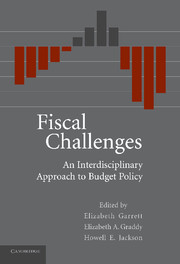Book contents
- Frontmatter
- Contents
- Preface
- Contributors
- PART ONE THE LAW AND POLITICS OF FISCAL POLICY
- PART TWO UNDERSTANDING FEDERAL DEFICITS AND PUBLIC DEBT
- PART THREE BUDGETING AND FISCAL CONSTRAINTS AT THE STATE LEVEL
- PART FOUR INTERGOVERNMENTAL ASPECTS OF BUDGET POLICY
- PART FIVE JUDICIAL POWERS AND BUDGET POLICY
- Index
PART FIVE - JUDICIAL POWERS AND BUDGET POLICY
Published online by Cambridge University Press: 23 December 2009
- Frontmatter
- Contents
- Preface
- Contributors
- PART ONE THE LAW AND POLITICS OF FISCAL POLICY
- PART TWO UNDERSTANDING FEDERAL DEFICITS AND PUBLIC DEBT
- PART THREE BUDGETING AND FISCAL CONSTRAINTS AT THE STATE LEVEL
- PART FOUR INTERGOVERNMENTAL ASPECTS OF BUDGET POLICY
- PART FIVE JUDICIAL POWERS AND BUDGET POLICY
- Index
Summary
In the world of budget policy, the primary government actors are the executive and legislative branches. The judiciary, however, also sometimes gets into the act. At the federal level, the courts occasionally are called upon to resolve disputes between the two other branches of government regarding the allocation of spending powers under the federal Constitution. So, for example, the Supreme Court has been called upon in recent times to rule on efforts of the executive to refrain from spending – either through impoundments or through a line-item veto – after the expenditures had been approved by Congress through authorizing legislation and appropriations. In both cases, the court ruled against the executive. On the other hand, the court also has invalidated provisions of the original Gramm-Rudman-Hollings Act, under which Congress had assigned to its own agent – the comptroller general – too great a role in the administration of the act's sequestration provisions.
Separation-of-powers cases are, however, exceptional, and the overwhelming majority of federal cases dealing with spending decisions resolve much more individualized disputes. Each year, the federal courts hear a multitude of cases whereby private parties seek monetary awards from the federal government for benefits promised under various entitlement programs, torts committed by government agents, contractual disputes involving government contracts, and even unconstitutional takings proscribed under the Fifth Amendment. In all these contexts, the federal government has submitted itself to the jurisdiction of the federal courts, waiving sovereign immunity and enacting various appropriations to fund damage awards.
- Type
- Chapter
- Information
- Fiscal ChallengesAn Interdisciplinary Approach to Budget Policy, pp. 399 - 400Publisher: Cambridge University PressPrint publication year: 2008

